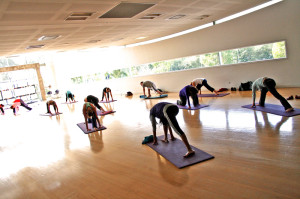- Calls to this hotline are currently being directed to Within Health, Fay or Eating Disorder Solutions
- Representatives are standing by 24/7 to help answer your questions
- All calls are confidential and HIPAA compliant
- There is no obligation or cost to call
- Eating Disorder Hope does not receive any commissions or fees dependent upon which provider you select
- Additional treatment providers are located on our directory or samhsa.gov
Dangers of Using Exercise as a Coping Tool in Eating Disorder Recovery

Contributor: Courtney Howard, B.A., Director of Operations & Business Development at Eating Disorder Hope and Addiction Hope.
Many people tout the benefits of engaging in exercise to relieve anxiety. This can be tricky for anyone in recovery from an eating disorder, particularly those who exercised compulsively while they were unwell.
How can you tell whether you are exercising for the right reasons? When does fitness cross the line from a healthy coping skill to part of your eating disorder?
There are ways to determine whether you are exercising in a mindful and healthful way, but when in doubt it is often best to choose an alternative method of stress reduction.
Benefits of Exercise for General Population
It is true that exercise has been proven to reduce stress. A recent publication by Harvard Medical School [1] explores the science behind this, explaining that physical exercise can reduce stress hormones adrenaline and cortisol while stimulating the production of endorphins. This can lead to the euphoric high that many experience during or after exercising.
The Anxiety and Depression Association of America (ADAA) also recommends physical activity as a coping mechanism to reduce stress. The organization states that as much as 14 percent of the population engages in exercise to cope with anxiety or high levels of stress.
Of course, these parties are not addressing the eating disorder community when praising the health benefits of fitness. It is important to keep that into perspective when reading anything with a similar message that is intended for the general population.
Compulsive Exercise & Eating Disorders
Compulsive exercise often co-occurs with eating disorders. This can take many forms, and the exact prevalence of compulsive exercise as an eating disorder behavior is unknown.
 A 2002 study [2] found that depression was more common among all eating disorder patients with a history of compulsive exercise than among those who did not engage in compulsive exercise. However, anxiety was only more common in anorexia nervosa patients with a history of compulsive exercise.
A 2002 study [2] found that depression was more common among all eating disorder patients with a history of compulsive exercise than among those who did not engage in compulsive exercise. However, anxiety was only more common in anorexia nervosa patients with a history of compulsive exercise.
These findings support the notion that compulsive exercise fuels eating disorders and co-occurring mental health conditions. Addressing compulsive exercise in treatment is vital to the recovery process.
Though exercise can reduce anxiety and stress, this proves it can also contribute to anxiety when exercise habits become pathological. This is especially true of fitness trends that primarily focus on numbers, weight loss, and extreme forms of fitness. For this reason, it is essential that anyone in recovery from an eating disorder choose alternative coping mechanisms.
Types of Exercise Recommended for Recovery
Exercise comes in many forms. If you are further along in your treatment and physical exercise has been approved by your treatment team, there are ways to engage that can support your recovery.
Mindful walks are a good first step when looking to get your blood pumping and body moving in a healthful way. Many people in recovery who have a history of compulsive exercise likely see this as an inadequate form of exercise. If you fall into this category, it is important to process why you only crave extreme fitness regimens, and what purpose that serves for you. Walking mindfully either in your neighborhood or a nearby park can be good for the body, mind, and soul.
 Yoga can also be very beneficial to those in eating disorder recovery, in part by restoring the mind-body connection. People with eating disorders, especially those who have experienced trauma, are often cut off from their bodies. Yoga can restore this connection and reduce stress.
Yoga can also be very beneficial to those in eating disorder recovery, in part by restoring the mind-body connection. People with eating disorders, especially those who have experienced trauma, are often cut off from their bodies. Yoga can restore this connection and reduce stress.
If you are engaging in exercise and start to question whether you are doing it for the right reasons or as part of your disorder, process these thoughts with your treatment team. Many people are afraid to share these feelings with their team out of fear they will be told to stop exercising entirely, but it is vital to be honest with those who are trying to help you.
Additionally, practice intuitive exercise by listing to your body and stopping when you are tired, rather than pushing yourself to the brink. This goes against what fitspo and gym culture tell us, but it is an essential form of self-care.
How to Respond to Gym Culture
As an individual in eating disorder recovery, how do you respond when faced with constant messages that exercise is the cure-all for stress and anxiety?
You are likely not going to change the mindset of a passing acquaintance who tells you to exercise more, or someone at the gym who asks why you are leaving mid-class. In these cases, never feel obligated to explain yourself. You know your truth and what is best for your recovery.
Alternatively, it can be empowering to share your recovery story if you are in a safe environment. You might be surprised how much others can relate.
Community Discussion – Share your thoughts here!
What do you say when people tell you to exercise to reduce stress, not knowing that you are in eating disorder recovery?
 About the Author: Courtney Howard is the Director of Operations & Business Development at Eating Disorder Hope and Addiction Hope. She graduated summa cum laude with a B.A. from San Diego State University, holds a paralegal certificate in Family Law, and is a Certified Domestic Violence Advocate. After obtaining her certification as a life coach, Courtney launched Lionheart Eating Disorder Recovery Coaching in 2015 and continues to be a passionate advocate for awareness and recovery.
About the Author: Courtney Howard is the Director of Operations & Business Development at Eating Disorder Hope and Addiction Hope. She graduated summa cum laude with a B.A. from San Diego State University, holds a paralegal certificate in Family Law, and is a Certified Domestic Violence Advocate. After obtaining her certification as a life coach, Courtney launched Lionheart Eating Disorder Recovery Coaching in 2015 and continues to be a passionate advocate for awareness and recovery.
References:
[1]: Exercising to relax. Harvard Health Publications, Harvard Medical School. Retrieved online October 5, 2016[2]: Peñas-Lledó, E., Vaz Leal, F. J. and Waller, G. (2002). Excessive exercise in anorexia nervosa and bulimia nervosa: Relation to eating characteristics and general psychopathology. Int. J. Eat. Disord., 31: 370–375. doi:10.1002/eat.10042
The opinions and views of our guest contributors are shared to provide a broad perspective of eating disorders. These are not necessarily the views of Eating Disorder Hope, but an effort to offer discussion of various issues by different concerned individuals.
We at Eating Disorder Hope understand that eating disorders result from a combination of environmental and genetic factors. If you or a loved one are suffering from an eating disorder, please know that there is hope for you, and seek immediate professional help.
Last Updated & Reviewed By: Jacquelyn Ekern, MS, LPC on October 12, 2016
Published on EatingDisorderHope.com

The EatingDisorderHope.com editorial team comprises experienced writers, editors, and medical reviewers specializing in eating disorders, treatment, and mental and behavioral health.

